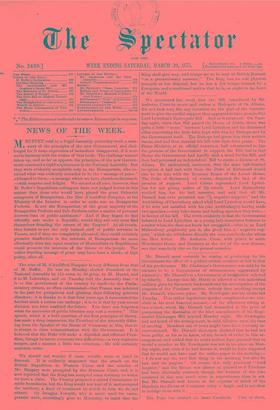We mentioned last week that the Bill introduced by Mr.
Assheton Cross to create and endow a Bishopric of St. Albans, did not look very like any intention on the part of the Govern- ment to give the cordial support they appeared to have promised to Lord Lyttelton's Episcopate Bill. And so it turns out. On Tues- day night, when that Bill passed the House of Lords, there was quite a little " scene " between Lord Lyttelton and his distrusted allies concerning the little faith kept with him by Bishops and by the Government itself. The Bishops had given him their written assent, and had then damned his bill with their faint praise. The Prime Minister, at an official interview, had volunteered to him the promise of the Government to support the Bill, but in that House the Government had hardly said a word for his Bill, and they had proposed an independent Bill to create a diocese of St. Albans. He understood, moreover, that the same half-hearted reception it had met with from the Duke of Richmond would also be its fate with the Treasury Bench of the Lower House. The Duke of Richmond, of course, disputed the fact of the promise of support. Lord Cairns reproached Lord Lyttel- ton for not giving notice of his attack. Lord Malmesbury scolded him for his bad manners, and said that all Mr. Disraeli had ever promised was "a negative support ;" and the Archbishop of Canterbury asked what Lord Lyttelton would have, if he were not satisfied with his (the Archbishop's) having made two speeches,—very luke-warm and boding speeches they were,— in favour of his bill. The truth evidently is that the Government behaved to Lord Lyttelton as a young lady sometimes behaves to a suitor when she does not know her ownimind,---that is, as Lord Malniesbury graphically put it, she give 73 him a "negative sup- port," which she withdraws directly she sees somebody else whom she likes better. Mr. Assheton Cross, with power to settle Winchester House and Danbury as the dot of the new diocese, was that somebody else on the present occasion.


































